Character Classes and Races
The following data is compiled from the Bard's Tale Manual, with additional game notes (possible minor spoilers) provided in bordered blocks:
Races
HUMAN
While possibly being of hardier stock, this character is nonetheless like you or me.
Average race, jack of all trades.
Available Classes: All classes
ELF
Patterned after the Tolkien elf, the elf is slight of build, frequently taller than a human, and very inclined to magic.
Gifted with higher Intelligence.
Available Classes: Warrior, Paladin, Rogue, Bard, Monk, Conjurer, Magician
DWARF
The Dwarven people are short and stout, extremely strong and healthy, but not amazingly intelligent (i.e., excellent fighters).
Gifted in strength and constitution.
Available Classes: Warrior, Paladin, Rogue, Bard, Hunter, Monk
HOBBIT
Hobbits are slightly smaller than Dwarves but are nimble and dexterous. Just the right make-up for a rogue.
Gifted in speed and luck.
Available Classes: Warrior, Rogue, Bard, Monk, Conjurer, Magician
HALF-ELF
These crossbreeds are usually blond and fair-skinned, like elves, and get some added size and strength from their human ancestry.
Part human, best of both worlds.
Available Classes: Warrior, Rogue, Bard, Monk, Conjurer, Magician
HALF-ORC
An orc is a large, goblin-like creature often found working for evil wizards. The Half-orc, being half human, is not quite as despicable as his orc parent, but you wouldn't want to date one.
Part human, with boosted strength.
Available Classes: Warrior, Rogue, Hunter, Conjurer, Magician
GNOME
Gnomes closely resemble dwarves, but have less hair and even shorter tempers. They are also more magically inclined, as a rule.
Nimble and intelligent.
Available Classes: Warrior, Rogue, Hunter, Monk, Conjurer, Magician
Attributes
Each character you create has five basic attributes which define his physical and mental prowess. When you create a character each attribute is assigned a value from 1 to 18, with the higher number reflecting higher capability.
[ST] STRENGTH:
Strength is physical power and chiefly affects the amount of damage a character can do to an opponent in hand-to-hand combat. Make sure your fighting characters are strong.
[IQ] INTELLIGENCE:
Intelligence is mental power. A high intelligence will enable your Magic Users to get bonus spell points.
[DX] DEXTERITY:
Measures agility & nimbleness. A high score makes your characters harder to hit and helps them strike the first blow in combat.
[CN] CONSTITUTION:
Measures healthiness. It takes more damage to kill a character with a high constitution score. This is reflected in bonus "hit points," the character's life span.
[LK] LUCK:
Luck is an ambiguous attribute, as it has a number of unseen effects on gameplay. For example, lucky characters are more likely to resist evil magic and avoid nasty traps.
Classes
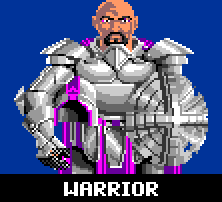 WARRIOR
WARRIOR
The base fighter-type in The Bard's Tale, warriors can use nearly every weapon there is. For every 4 levels of experience after the 1st, Warriors get an extra attack ability in combat.
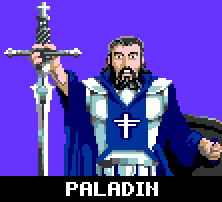 PALADIN
PALADIN
Paladins are fighters who have sworn to abstain from all evil and to uphold honor and purity in all places. They can use most weapons and some that no other fighters can. They get multiple attacks at higher levels. They also have a greatly increased resistance to evil magic.
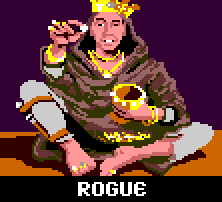 ROGUE
ROGUE
A professional thief with so-so combat ability, the rogue can hide in shadows, search for traps and disarm them. Without a rogue your party will pay very dearly for the booty it wins.
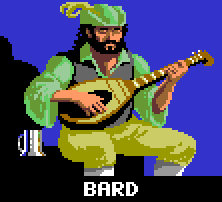 BARD
BARD
The Bard is a wandering minstrel. You'll see him with a tankard of ale in front of him in the less reputable taverns -- the rowdier the better. Bards were once warriors, and can still use most warrior weapons. But they turned to music instead and now play songs with an almost magical effect on other characters. Bards don't get the warrior's advantage of extra attacks in combat anymore -- but their magic is so unique, it is almost impossible to survive Skara Brae without one.
Any true Bard has six songs on his lips, though to play them he must have an instrument equipped. A song played as the party is exploring is long-lasting and continues even after the party returns from combat mode, even if other songs were played during combat. Any songs played during combat are abbreviated and so create different magical effects than the full non-combat versions. The shorter combat versions don't endure as long either, only one round of fighting.
Only one Bard tune can be played at a time. If a second one is played while the first is still playing (by the same or a different Bard), the first will end. A Bard can play as many tunes as experience levels before his throat gets dry. Then it's off to a tavern for a drink to rejuvenate his voice. Tough duty, but someone has to do it.
Bard songs vary according to the difficulty of the dungeon. When the going gets tough, the Bard goes drinking.
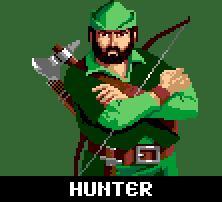 HUNTER
HUNTER
An assassin, a mercenary, a ninja. The hunter can use most weapons, and has the ability (which grows with experience) to do critical hits in combat (i.e., to attack a nerve center or other vital area and instantly kill an opponent). A good skill.
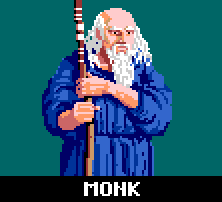 MONK
MONK
A martial artist, an almost inhuman fighting machine trained to fight without weapons or armor. The monk can use them, but, at higher levels particularly, often does better without.
The Monk's melee attack damage increases significantly level by level, most effective when not having an equipped weapon.
Damage inflicted by level:
1-2) 4, 3-4) 8, 5-6) 16, 7-8) 16, 9-12) 32, 13-16) 40, 17-24) 48, 25-30) 56, 31-39) 80, 40-48) 96, 49-55) 128, 56-61) 160, 62-63) 192, 64) 234
Spellcasters
Magic users gain access to a book of spells belonging to their class. They level up by gaining experience just as any other class, however they gain the ability to improve their spell level after the Review Board has deemed them worthy - that is, for every 2 experience levels, they may purchase the next level of spells for their class (see Spell Points below).
After learning their 3rd level in any spell class, they are also granted the right, if they so choose, to convert to a new spellcaster class. In doing so however, they forfeit their right to learn any further spells in the class(es) they left behind.
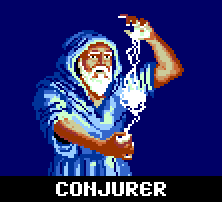 CONJURER
CONJURER
One of the 4 classes of Magic Users, Conjurers deal in the physical creation and manifestation of real things (like fire, light, healing).
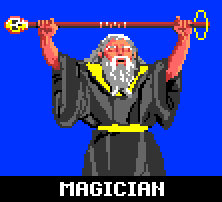 MAGICIAN
MAGICIAN
Another of the 4 classes of Magic Users, Magicians deal with magic as it affects physical objects (i.e., enchanting a sword, making armor stronger, making a dungeon wall disappear).
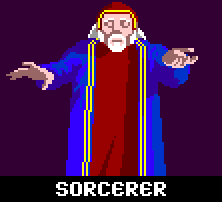 SORCERER
SORCERER
Sorcerers are Magic Users who deal with the creation and manipulation of illusion. Due to the power of sorcerer spells, this class is not available to newly created characters.
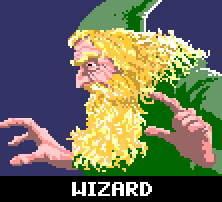 WIZARD
WIZARD
Wizards are Magic Users who are dedicated to the summoning and binding of various supernatural creatures. These creatures are not friendly to humankind and trying to control them is extremely hazardous. The Wizard-class is not available to new characters either.
Character Properties/stats
[AC] Armour Class
This statistic reflects the level of protection a character has from physical attack. In classic fantasy role-playing style, the armor class starts at 10 for a totally unprotected, unarmored character with low dexterity, and goes down to -10 (called LO) as his protection improves by armor, spells, or other means.
AC rating also has the additional effect of providing a boost to the chance of successfully attacking an enemy. A lower AC provides better defense as well as offense.
[HP] Hit Points
Hit Points measure the damage a character can take before he is killed. The "Hits" statistic shows his potential at fullest health, rather than current status.
[COND] Condition
Condition shows the character's present number of hit points. For example, if a character with 10 Hit Points is wounded for 7 hit points, his Condition will drop to 3. Another wound of 3 or more hit points will kill him. If he is fully healed, his Condition will return to the full 10 again. (Even though his Condition score changes, his Hit Points stay at 10.)
Condition may also indicate a special state as an effect of a magic spell or item or other form of attack. These include:
DEAD - Self explanatory
OLD - Withered, with greatly reduced AC rating
POISoned - Hit points will slowly drain as long as the character is afflicted
STONed - Character has been petrified and effectively DEAD, unless revived by special means
PARAlyzed - Temporarily immobilized from performing actions
POSSessed - Character becomes antagonistic towards the party and launches dissention in the ranks
NUTS - Crazy in the head. May launch into a party attack
[SP] Spell Points
This shows current spell point status. Points are used up with each cast of a magic spell. If a Conjurer has 20 spell points and casts a Mage Flame spell at a cost of 2 spell points, his new total would be 18. A character's maximum spell points are listed in his view-character mode.
[XP] Experience Points
This measures abilities gained by experience, the higher the number, the better the character. Characters get experience points for successful combat, according to the difficulty of the fight and the number of characters who survive. The amount is indicated after every successful combat. A character's running total of experience points is indicated in view-mode.
Different classes advance at different rates of experience.
| Level | Wa/Pa/Hu/Ba/Ro | Mo/Co/Ma | So | Wi |
| 2 | 2,000 | 1,800 | 7,000 | 20,000 |
| 3 | 4,000 | 4,000 | 15,000 | 50,000 |
| 4 | 7,000 | 6,000 | 25,000 | 80,000 |
| 5 | 10,000 | 10,000 | 40,000 | 120,000 |
| 6 | 15,000 | 14,000 | 60,000 | 160,000 |
| 7 | 20,000 | 19,000 | 80,000 | 200,000 |
| 8 | 30,000 | 29,000 | 100,000 | 250,000 |
| 9 | 50,000 | 50,000 | 130,000 | 300,000 |
| 10 | 80,000 | 90,000 | 170,000 | 400,000 |
| 11 | 110,000 | 120,000 | 220,000 | 600,000 |
| 12 | 150,000 | 170,000 | 300,000 | 900,000 |
| 13 | 200,000 | 230,000 | 400,000 | 1,300,000 |
| Beyond this point, experience point requirements remain constant per level |
| 14+ | +200,000 | +230,000 | +400,000 | +1,300,000 |
| ... |
| 20 | 1,600,000 | 1,840,000 | 3,200,000 | 10,400,000 |
| ... |
Gold
Gold is the unit of currency in this world. Your characters start with just barely enough gold to buy the armor and weapons they need to survive. There are two ways to get rich enough to buy better equipment: taking gold from the monsters you defeat in combat or selling items you find in dungeons. The first way is more fun.
Levels
Level is a general measure of achievement within a character's class. Level 1 is a novice, Level 13, for example, is required to become a Master of a Magic User class.
The Review Board will promote a character to higher levels based on his experience points, but only upon the character's in-person request. An advance in level is very important because it generally means an increase in attribute scores, hit points, spell points and other abilities.
See the Monk class above for hints about the effect of increasing levels on attack effectiveness.
Spell Levels
This shows the highest group of magic spells a character can use in any of the 4 classes of Magic Users. There are 7 groups of magic spells for each different class.
Spell levels can be purchased at the Review Board, at the rate of one spell level every two experience levels.
When leveling up at the Review Board, learning a new spell level costs the following gold:
Lvl2) 1000, Lvl3) 2000, Lvl4) 4000, Lvl5) 7000, Lvl6) 10000, Lvl7) 20000
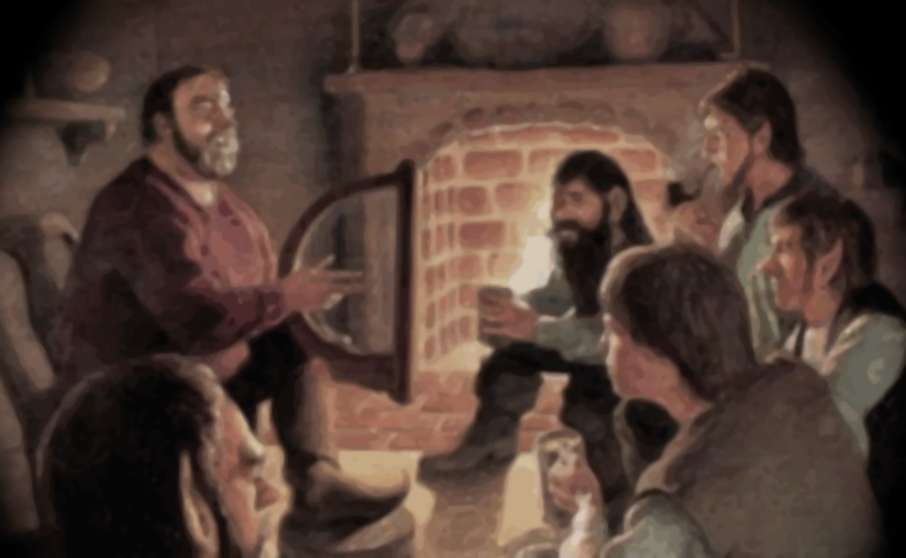
 WARRIOR
WARRIOR
 PALADIN
PALADIN
 ROGUE
ROGUE
 BARD
BARD
 HUNTER
HUNTER
 MONK
MONK
 CONJURER
CONJURER
 MAGICIAN
MAGICIAN
 SORCERER
SORCERER
 WIZARD
WIZARD